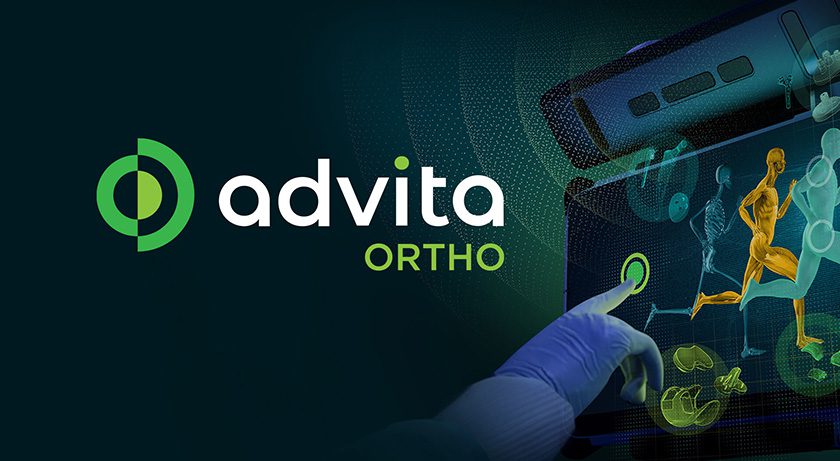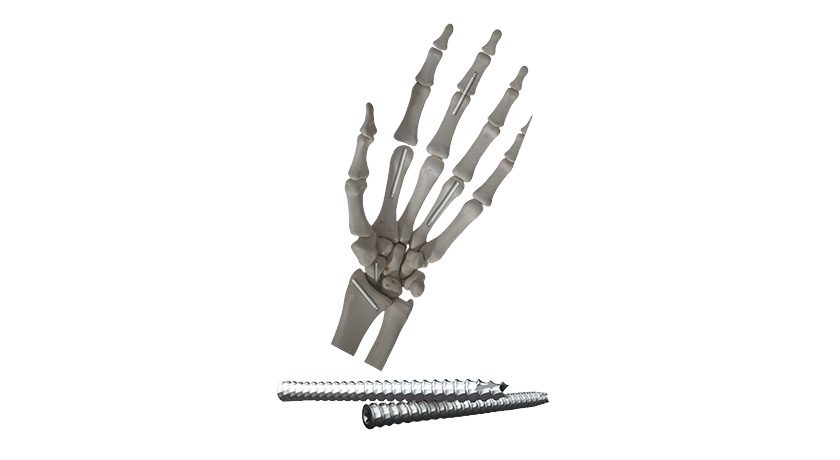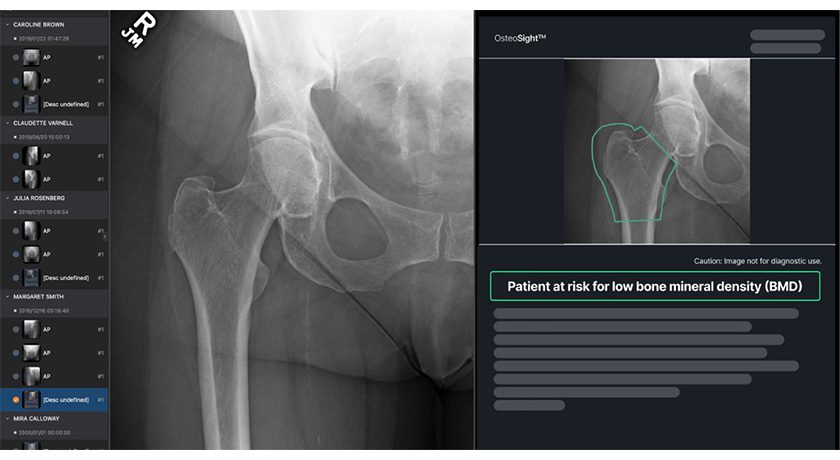

 Copy to clipboard
Copy to clipboard 
The Musculoskeletal New Ventures Conference (MNVC) is a highlight of our travels each year, as it offers the opportunity to hear dozens of companies pitch how they’re advancing orthopedic care, enhancing operating room efficiency, and improving patient recovery. This year’s lineup of companies spans most of the orthopedic market, providing attendees with a glimpse of the unmet needs that startups are trying to address.
MNVC will take place November 4-5 in Memphis. ORTHOWORLD Senior Market Analyst Mike Evers and I look forward to connecting with those in attendance and providing recap articles on the technology and trends that stood out to us. Until then, here are a few companies on the agenda that piqued our interest.
Knee Preservation
Numerous orthopedic startups are focused on providing pain relief and stability for patients who suffer from deterioration or trauma in the knee joint, but aren’t yet ready for total replacement. Three presenting companies are undergoing the regulatory process for meniscus replacement or treatment of cartilage defects.
Phoenix Kinetics aims to commercialize the NUsurface meniscus replacement implant, targeting patients with knee osteoarthritis who fall between the options of meniscal allograft transplantation and total knee replacement. NUsurface is a polycarbonate-urethane implant that, due to its materials, composite structure, and design, allows it to be non-fixated to bone or soft tissue. Multiple clinical trials showed consistent pain reduction and improved physical function in up to 80% of patients who received the implant.
NUsurface was initially developed by Active Implants, which engaged in two clinical studies and FDA’s Breakthrough Device Designation pathway but failed to be granted a De Novo. Former Active Implant employees have picked up the baton, confirmed the requested data to FDA, and closed a Series A funding round in an effort to bring the implant to market in the U.S.
Nanochon has developed Chondrograft, a next-generation implant designed to address focal cartilage defects. The company’s fully synthetic, nylon-based composite material mimics the organized collagen fiber structure of natural cartilage. The 3D-printed implant provides the necessary strength for weight-bearing while also serving as a scaffold, supporting the growth of cartilage and bone tissue. Chondrograft is placed during a press-fit procedure.
In July, Nanochon announced that it had been granted Health Canada Approval for its first in-human clinical trial. Chondrograft is being evaluated in a prospective, 10-patient, early feasibility study for use in knee cartilage restoration in eligible patients aged 22 to 60 years with femoral condyle and/or trochlea articular cartilage lesions.
OrthoPreserve is targeting meniscus replacement with Defender, an implant made from a composite material that mimics the shape, structure and properties of natural meniscus tissue to restore the cushioning and stabilization functions of the meniscus. The implant is delivered and fixated in the joint through common minimally invasive arthroscopic techniques.
The company has demonstrated the feasibility of the implant in animal, cadaver and benchtop studies and plans to launch its human clinical trials in 2026. Earlier this year, OrthoPreserve was granted both a Breakthrough Device Designation and Total Product Life Cycle Advisory Program enrollment, aiming for potential FDA approval by 2029.
Powered Instruments
Powered instruments is a segment that typically doesn’t get a lot of coverage. Three companies in the space, each addressing cost and sterilization challenges, will be speaking at MNVC.
Insurgical’s Large Bone product line consists of an Oscillating Saw, a Drill/Reamer and a Reciprocating Saw, all of which are single-use power tools that come pre-tested and terminally sterilized. The company is addressing the high upfront costs and the need for sterilization and maintenance associated with traditional power tools.
Insurgical’s model allows facilities to stock tools, use them as needed and then return them to the factory for sterilization and maintenance. Surgical facilities only pay for the inventory they bring in, reducing their post-use costs.
Hubly Surgical introduced the FDA-cleared Hubly Drill, a single-use cranial access kit and drill. The cordless design turns burr hole drilling into a one-handed procedure for surgeons, increasing stability, ease of use and speed.
The drill’s safety features include the SMART Auto-Stop and drill bit geometry, designed to reduce over-plunge into the skull, as well as the LED Force Indicator, which changes color with force to enhance user control. The drill’s advanced safety and efficiency features, along with its full cranial kit of drill bits, reduce operating costs.
As of January 2025, the company had sold 4,500 Hubly Drills and noted no adverse events.
Arbutus Medical was founded to develop sterile-packed procedure kits and surgical drill platforms to help surgeons in low-resource hospitals. The company’s Surgical Power Kit includes a modified DEWALT drill, batteries, charger and pin snips. Its TrakPak, a sterile-packed procedure kit, offers surgical components to streamline skeletal traction.
Arbutus Medical’s products have been used in 40 countries and enabled more than 85,000 surgeries. The company’s surgical devices are FDA-cleared and licensed by Health Canada.
AI-Driven Platforms
Multiple companies are pitching their AI platforms that use data to inform surgeon decision making and patient recovery. These tech companies might provide orthopedic strategics with ideas on how to bring more data into their ecosystems.
Redefine Surgery is developing an AI platform that helps surgeons implant instruments and devices with greater speed and precision. The company notes that surgeons have long refined their skills by watching other surgeons in the operating room. By building a dataset of work by expert surgeons, the company advances surgical guidance and creates an AI mentor capable of delivering significant clinical outcomes.
The company’s Mentor Vision System uses multiple cameras to capture the surgical field, creating a 3D model of the patient, surgeon and operating theater. AI technology is then used to analyze the models, tracking the movements of instruments, surgeons and patients. The collected data is then used to understand surgical decisions and help surgeons improve their precision.
Plethy’s Recupe is an insurance and health technology solution platform that enables personalized recovery and expedited claims closure. The platform, designed for all musculoskeletal conditions and workers’ compensation situations, combines personalized care with data-driven insights to support patients in their at-home recovery and empower quicker provider intervention.
Plethy uses a patient app, wearable sensors, empathetic coaching and data-driven insights to engage patients in their care. The company’s data show that patients who use Recupe experience fewer complications, less pain, and return to work sooner.
AGADA Medical is developing The Spine Oracle, an insight analytics platform designed to help eliminate unnecessary spine surgeries and assist with optimizing the outcomes of appropriate surgeries. The company compiles anthropometric, demographic, imaging, and diagnostic data, and calculates the forces on a patient’s spine to provide surgeons with the most appropriate, least invasive surgical option.
The company notes that spinal surgeries have a high failure rate, resulting in revision surgeries, structural deterioration and long recovery times. AGADA Medical’s AI platform utilizes next-generation bio-mechanical simulation and human 3D modeling software to determine the likelihood of success or failure prior to Surgery.
These are just nine of the companies presenting at MNVC. Check out the complete list of startups and investors presenting.
The Musculoskeletal New Ventures Conference (MNVC) is a highlight of our travels each year, as it offers the opportunity to hear dozens of companies pitch how they’re advancing orthopedic care, enhancing operating room efficiency, and improving patient recovery. This year’s lineup of companies spans most of the orthopedic market, providing...
The Musculoskeletal New Ventures Conference (MNVC) is a highlight of our travels each year, as it offers the opportunity to hear dozens of companies pitch how they’re advancing orthopedic care, enhancing operating room efficiency, and improving patient recovery. This year’s lineup of companies spans most of the orthopedic market, providing attendees with a glimpse of the unmet needs that startups are trying to address.
MNVC will take place November 4-5 in Memphis. ORTHOWORLD Senior Market Analyst Mike Evers and I look forward to connecting with those in attendance and providing recap articles on the technology and trends that stood out to us. Until then, here are a few companies on the agenda that piqued our interest.
Knee Preservation
Numerous orthopedic startups are focused on providing pain relief and stability for patients who suffer from deterioration or trauma in the knee joint, but aren’t yet ready for total replacement. Three presenting companies are undergoing the regulatory process for meniscus replacement or treatment of cartilage defects.
Phoenix Kinetics aims to commercialize the NUsurface meniscus replacement implant, targeting patients with knee osteoarthritis who fall between the options of meniscal allograft transplantation and total knee replacement. NUsurface is a polycarbonate-urethane implant that, due to its materials, composite structure, and design, allows it to be non-fixated to bone or soft tissue. Multiple clinical trials showed consistent pain reduction and improved physical function in up to 80% of patients who received the implant.
NUsurface was initially developed by Active Implants, which engaged in two clinical studies and FDA’s Breakthrough Device Designation pathway but failed to be granted a De Novo. Former Active Implant employees have picked up the baton, confirmed the requested data to FDA, and closed a Series A funding round in an effort to bring the implant to market in the U.S.
Nanochon has developed Chondrograft, a next-generation implant designed to address focal cartilage defects. The company’s fully synthetic, nylon-based composite material mimics the organized collagen fiber structure of natural cartilage. The 3D-printed implant provides the necessary strength for weight-bearing while also serving as a scaffold, supporting the growth of cartilage and bone tissue. Chondrograft is placed during a press-fit procedure.
In July, Nanochon announced that it had been granted Health Canada Approval for its first in-human clinical trial. Chondrograft is being evaluated in a prospective, 10-patient, early feasibility study for use in knee cartilage restoration in eligible patients aged 22 to 60 years with femoral condyle and/or trochlea articular cartilage lesions.
OrthoPreserve is targeting meniscus replacement with Defender, an implant made from a composite material that mimics the shape, structure and properties of natural meniscus tissue to restore the cushioning and stabilization functions of the meniscus. The implant is delivered and fixated in the joint through common minimally invasive arthroscopic techniques.
The company has demonstrated the feasibility of the implant in animal, cadaver and benchtop studies and plans to launch its human clinical trials in 2026. Earlier this year, OrthoPreserve was granted both a Breakthrough Device Designation and Total Product Life Cycle Advisory Program enrollment, aiming for potential FDA approval by 2029.
Powered Instruments
Powered instruments is a segment that typically doesn’t get a lot of coverage. Three companies in the space, each addressing cost and sterilization challenges, will be speaking at MNVC.
Insurgical’s Large Bone product line consists of an Oscillating Saw, a Drill/Reamer and a Reciprocating Saw, all of which are single-use power tools that come pre-tested and terminally sterilized. The company is addressing the high upfront costs and the need for sterilization and maintenance associated with traditional power tools.
Insurgical’s model allows facilities to stock tools, use them as needed and then return them to the factory for sterilization and maintenance. Surgical facilities only pay for the inventory they bring in, reducing their post-use costs.
Hubly Surgical introduced the FDA-cleared Hubly Drill, a single-use cranial access kit and drill. The cordless design turns burr hole drilling into a one-handed procedure for surgeons, increasing stability, ease of use and speed.
The drill’s safety features include the SMART Auto-Stop and drill bit geometry, designed to reduce over-plunge into the skull, as well as the LED Force Indicator, which changes color with force to enhance user control. The drill’s advanced safety and efficiency features, along with its full cranial kit of drill bits, reduce operating costs.
As of January 2025, the company had sold 4,500 Hubly Drills and noted no adverse events.
Arbutus Medical was founded to develop sterile-packed procedure kits and surgical drill platforms to help surgeons in low-resource hospitals. The company’s Surgical Power Kit includes a modified DEWALT drill, batteries, charger and pin snips. Its TrakPak, a sterile-packed procedure kit, offers surgical components to streamline skeletal traction.
Arbutus Medical’s products have been used in 40 countries and enabled more than 85,000 surgeries. The company’s surgical devices are FDA-cleared and licensed by Health Canada.
AI-Driven Platforms
Multiple companies are pitching their AI platforms that use data to inform surgeon decision making and patient recovery. These tech companies might provide orthopedic strategics with ideas on how to bring more data into their ecosystems.
Redefine Surgery is developing an AI platform that helps surgeons implant instruments and devices with greater speed and precision. The company notes that surgeons have long refined their skills by watching other surgeons in the operating room. By building a dataset of work by expert surgeons, the company advances surgical guidance and creates an AI mentor capable of delivering significant clinical outcomes.
The company’s Mentor Vision System uses multiple cameras to capture the surgical field, creating a 3D model of the patient, surgeon and operating theater. AI technology is then used to analyze the models, tracking the movements of instruments, surgeons and patients. The collected data is then used to understand surgical decisions and help surgeons improve their precision.
Plethy’s Recupe is an insurance and health technology solution platform that enables personalized recovery and expedited claims closure. The platform, designed for all musculoskeletal conditions and workers’ compensation situations, combines personalized care with data-driven insights to support patients in their at-home recovery and empower quicker provider intervention.
Plethy uses a patient app, wearable sensors, empathetic coaching and data-driven insights to engage patients in their care. The company’s data show that patients who use Recupe experience fewer complications, less pain, and return to work sooner.
AGADA Medical is developing The Spine Oracle, an insight analytics platform designed to help eliminate unnecessary spine surgeries and assist with optimizing the outcomes of appropriate surgeries. The company compiles anthropometric, demographic, imaging, and diagnostic data, and calculates the forces on a patient’s spine to provide surgeons with the most appropriate, least invasive surgical option.
The company notes that spinal surgeries have a high failure rate, resulting in revision surgeries, structural deterioration and long recovery times. AGADA Medical’s AI platform utilizes next-generation bio-mechanical simulation and human 3D modeling software to determine the likelihood of success or failure prior to Surgery.
These are just nine of the companies presenting at MNVC. Check out the complete list of startups and investors presenting.

You’ve reached your limit.
We’re glad you’re finding value in our content — and we’d love for you to keep going.
Subscribe now for unlimited access to orthopedic business intelligence.
CL
Carolyn LaWell is ORTHOWORLD's Chief Content Officer. She joined ORTHOWORLD in 2012 to oversee its editorial and industry education. She previously served in editor roles at B2B magazines and newspapers.







